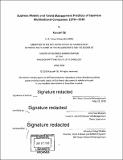Business models and talent management practices of Japanese multinational companies : 1970-2018
Author(s)
Oji, Kazuaki
DownloadFull printable version (7.669Mb)
Other Contributors
Sloan School of Management.
Advisor
John Van Maanen.
Terms of use
Metadata
Show full item recordAbstract
Few other countries have experienced as much rapid economic change as Japan. In the 1970s and 1980s, Japan was praised as "global number one" because of its extraordinary economic growth. However, from the early 1990s, the Japanese economy began to decline, and the global presence of major Japanese companies also started to diminish. Today, Japan is again on the track toward economic growth, and Japanese companies are recovering their growth momentum. During this period, Japanese companies began to change their global business strategies. During the earlier years, their core capabilities were centralized in Japan, but they have gradually shifted their R&D and marketing functions from Japan to overseas subsidiaries. Some companies are now optimizing their value chain without regard to entity and/or location limitations. These changes in global strategy should also align with changes in their talent management practices. However, I believe some Japanese companies are not making the needed changes in a timely manner. In this thesis, I explore the transition of business and talent management practices of Japanese companies, mainly manufacturers, and discuss the challenges they now face. Further, I provide suggestions to help facilitate the transformation of human resource management practices in Japanese companies.
Description
Thesis: M.B.A., Massachusetts Institute of Technology, Sloan School of Management, 2018. Cataloged from PDF version of thesis. Includes bibliographical references (pages 93-98).
Date issued
2018Department
Sloan School of ManagementPublisher
Massachusetts Institute of Technology
Keywords
Sloan School of Management.